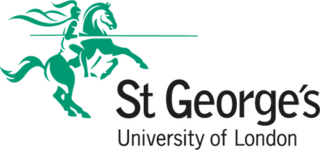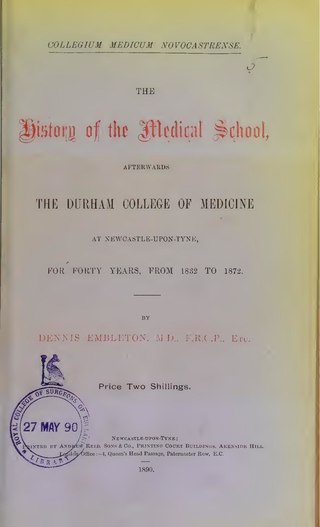Doctor of Medicine is a medical degree, the meaning of which varies between different jurisdictions. In the United States, and some other countries, the M.D. denotes a professional degree. This generally arose because many in 18th-century medical professions trained in Scotland, which used the M.D. degree nomenclature. In England, however, Bachelor of Medicine, Bachelor of Surgery (M.B.B.S.) was used and eventually in the 19th century became the standard in Scotland too. Thus, in the United Kingdom, Ireland and other countries, the M.D. is a research doctorate, honorary doctorate or applied clinical degree restricted to those who already hold a professional degree (Bachelor's/Master's/Doctoral) in medicine. In those countries, the equivalent professional degree to the North American, and some others' usage of M.D. is still typically titled Bachelor of Medicine, Bachelor of Surgery.
A medical school is a tertiary educational institution, professional school, or forms a part of such an institution, that teaches medicine, and awards a professional degree for physicians. Such medical degrees include the Bachelor of Medicine, Bachelor of Surgery, Master of Medicine, Doctor of Medicine (MD), or Doctor of Osteopathic Medicine (DO). Many medical schools offer additional degrees, such as a Doctor of Philosophy (PhD), master's degree (MSc) or other post-secondary education.

St George's, University of London, legally St George's Hospital Medical School, is a public university in Tooting, South London, England, and is a member institution of the federal University of London. In August 2024, St George's will merge with City, University of London to form City St George's, University of London.
A Doctor of Pharmacy is a professional doctorate degree. In some countries, it is a proficient graduate degree to practice the profession of pharmacy or to become a clinical pharmacist. In many countries, people with their Doctor of Pharmacy are allowed to practice independently and can prescribe over-the-counter drugs directly to patients that doesn't require prescription in other countries. A PharmD program has significant experiential and/or clinical education components in introductory and advanced levels for the safe and effective use of drugs. Experiential education prepares graduates to be practice-ready, as they already have spent a significant amount of time training in areas of direct patient care and research.
A Bachelor of Medicine, Bachelor of Surgery is a medical degree granted by medical schools or universities in countries that adhere to the United Kingdom's higher education tradition. Despite the historical distinction in nomenclature, these degrees are typically combined and conferred together. This degree is usually awarded as an undergraduate degree, but it can also be awarded at graduate-level medical institutions. The typical duration for completion is five to six years.
A medical degree is a professional degree admitted to those who have passed coursework in the fields of medicine and/or surgery from an accredited medical school. Obtaining a degree in medicine allows for the recipient to continue on into specialty training with the end goal of securing a license to practice within their respective jurisdiction. Medical graduates may also pursue non-clinical careers including those in basic research and positions within the healthcare industry. A worldwide study conducted in 2011 indicated on average: 64 university exams, 130 series exams, and 174 assignments are completed over the course of 5.5 years. As a baseline, students need greater than an 85% in prerequisite courses to enrol for the aptitude test in these degree programs.
A number of professional degrees in dentistry are offered by dental schools in various countries around the world.
The Graduate Medical School Admissions Test is a test used to select candidates applying to study medicine, dentistry, optometry, pharmacy and veterinary science at Australian, British, and Irish universities for admission to their Graduate Entry Programmes. Candidates may take the test in a test centre in one of the 6 countries, being Australia, Ireland, New Zealand, Singapore, the United Kingdom and the United States, offering the test.

Hamdard University is a private research university with campuses in Karachi and Islamabad, Pakistan. It was founded in 1991 by the philanthropist Hakim Said of the Hamdard Foundation. It is one of the first and oldest private institutions of higher education in Pakistan, and also is the largest private research university in Karachi, with an campus area of over 350 acres.

Newcastle University School of Medicine is the medical school at Newcastle University in England. It was established in 1834 in the city of Newcastle upon Tyne and served as the College of Medicine in connection with Durham University from 1851 to 1870 and then, as a full college of the university, Durham University College of Medicine from 1870 to 1937 when it joined Armstrong College, to form King's College, Durham. In 1963 King's College became the University of Newcastle upon Tyne. The university now uses the name "Newcastle University".
The Master of Public Health(MPH), Master of Science in Public Health (MSPH), Master of Medical Science in Public Health (MMSPH) and the Doctor of Public Health (DrPH), International Masters for Health Leadership (IMHL) are interdisciplinary professional degrees awarded for studies in areas related to public health. The MPH degree focuses on public health practice, as opposed to research or teaching. Master of Public Health programs are available throughout the world in Schools of Public Health, Programs in Public Health, Medical Schools, and Schools of Public Affairs. MPH degrees, in addition to including a core curriculum, will usually also let students pursue a specialization in a specific field, such as epidemiology, biostatistics, or health management.

The UCD School of Medicine at University College Dublin, Ireland, was founded in 1854. At undergraduate level, the school offers programmes in Medicine MB BCh BAO, BSc Biomedical Health and Life Sciences, and the BSc Radiography. At graduate level, the school UCD offers over 40 programmes for health care professionals.
A Bachelor of Pharmacy is a graduate academic degree in the field of pharmacy. In many countries, this degree is a prerequisite for registration to practice as a pharmacist. Since both PharmB and PharmD are prerequisites to license in most Western countries they are considered equivalent. In many Western countries, foreign graduates with BPharm, PharmB, or BS Pharm practice similarly as PharmD graduates. It is analogous to an MBBS vs. an MD, where MBBS is the foreign equivalent of MD. The degree provides training to understand the properties and impacts of medicines and develop the skills required to counsel patients about their use.

The School of Clinical Medicine is the medical school of the University of Cambridge in England. The medical school is considered as being one of the most prestigious in the world, ranking as 1st in The Complete University Guide, followed by Oxford University Medical School, Harvard Medical School, and Stanford School of Medicine and 2nd in the world in the 2023 Times Higher Education Ranking. The Cambridge Graduate Course in Medicine (A101) is the most competitive course offered by the University and in the UK, and is among the most competitive medical programs for entry in the world. The school is located alongside Addenbrooke's Hospital and other institutions in multiple buildings across the Cambridge Biomedical Campus.
A professional degree, formerly known in the US as a first professional degree, is a degree that prepares someone to work in a particular profession, practice, or industry sector often meeting the academic requirements for licensure or accreditation. Professional degrees may be either graduate or undergraduate entry, depending on the profession concerned and the country, and may be classified as bachelor's, master's, or doctoral degrees. For a variety of reasons, professional degrees may bear the name of a different level of qualification from their classification in qualifications, e.g., some UK professional degrees are named bachelor's but are at master's level, while some Australian and Canadian professional degrees have the name "doctor" but are classified as master's or bachelor's degrees.
The European University Cyprus (EUC) is a private non- profit university in Nicosia, Cyprus which evolved out of Cyprus College, the oldest institution of higher education in Cyprus. EUC has a selective admission policy based on students' past academic record and performance. The institution has a current enrollment of over 8,500 students and provides internationally recognized undergraduate, graduate, and doctorate degrees. The programs of study are graded based on the European Credit Transfer and Accumulation System (ECTS).
A clinical officer (CO) is a gazetted officer who is qualified and licensed to practice medicine.

Physical therapy education varies greatly from country to country. Worldwide, physical therapy training ranges from basic work site education in hospitals and outpatient clinics to professional doctoral degree and masters programs.
Medical education in Ireland is the education of medical students and qualified medical doctors across the island of Ireland.






